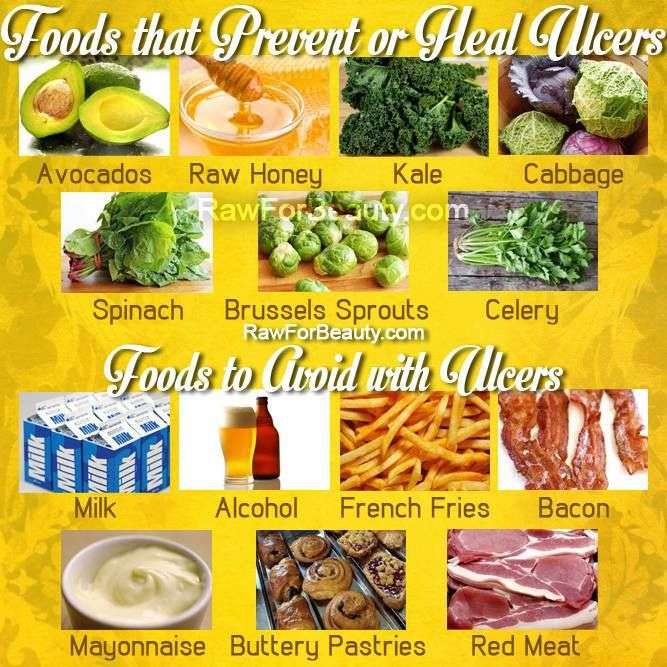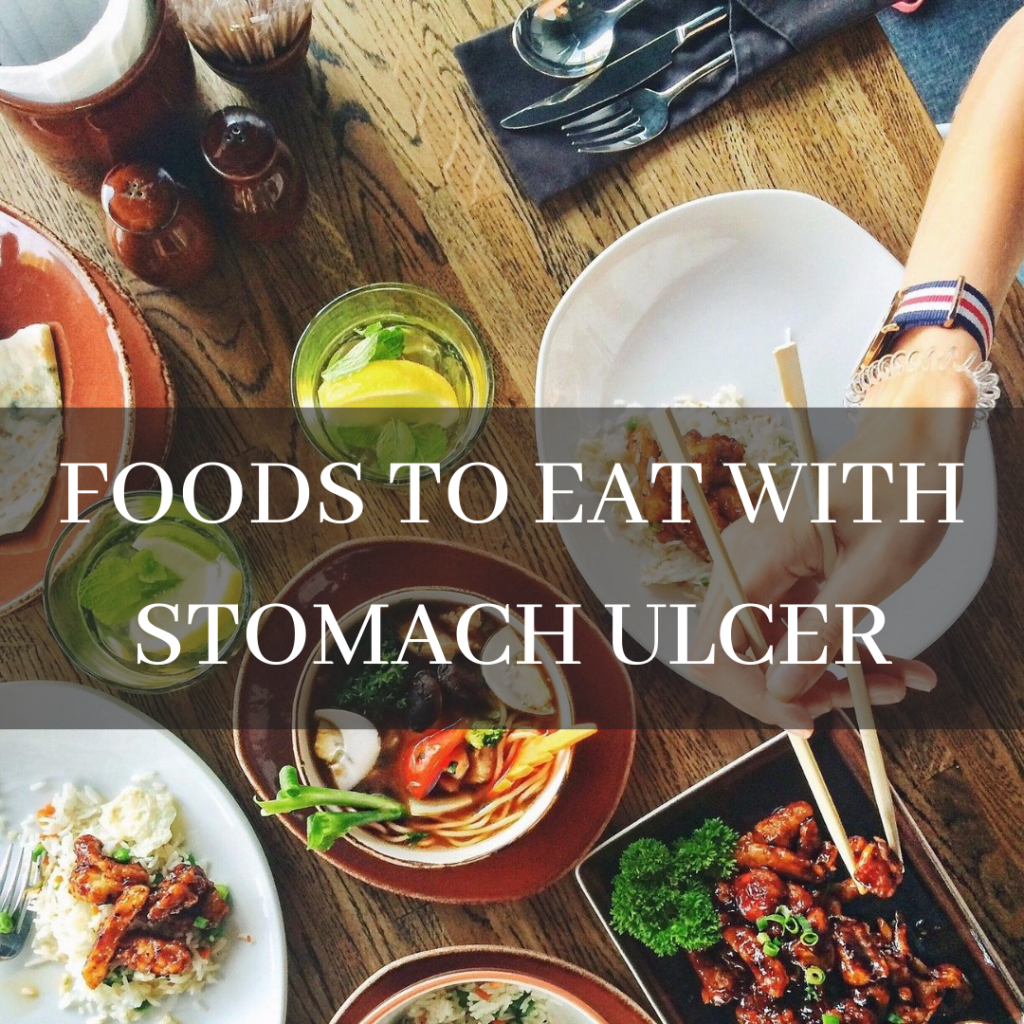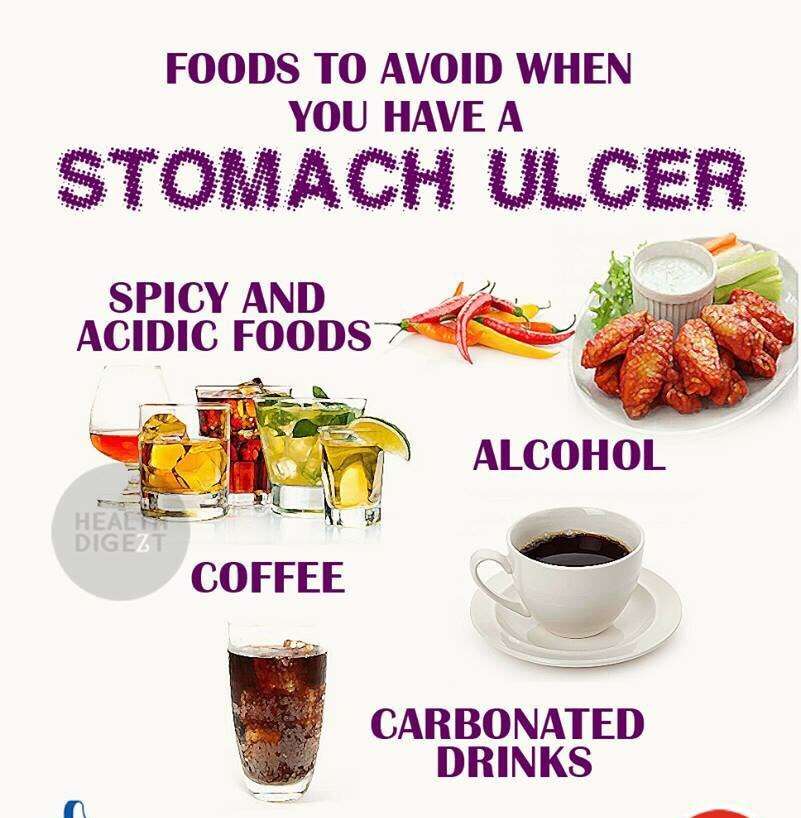Foods To Eat With A Peptic Ulcer
A bland diet is generally your best bet when dealing with a peptic ulcer. These foods are low in acidity, saturated fats, and spiciness.
Another rule of thumb is to choose foods that are high in dietary fiber, both soluble and insoluble. Studies have shown that fiber-rich diets reduce the risk of peptic ulcers by lowering stomach acids. Foods that are rich in vitamin A have similar effects.
Foods that are probiotic can speed healing by blocking H. pylori from attaching to the lining of the stomach. Probiotic-rich foods include pickled vegetables as well as certain fermented dairy products like yogurt and kefir.
Foods rich in flavonoids are also believed to inhibit the growth of H. pylori in the gut. These plant-based nutrients are found in berries and many other fruits and vegetables.
Among the foods you can eat if you have a peptic ulcer are:
- Bean and legumes, which are fiber-rich
- Eggs, which are rich in vitamin A
- Fish, including fatty fish that are rich in omega-3 polyunsaturated fats
- Fiber-rich fruits, like apples, bananas, strawberries, and raspberries
- Flavonoid-rich foods, like cranberries, kale, broccoli, celery, and all berries
- Leafy green vegetables, which are rich in vitamin A
- Orange and yellow vegetables, like sweet potatoes and summer squash that are also rich in vitamin A
- Pickled foods, like kimchi, sauerkraut, and dill pickles
- Lean meats and poultry
Avoid Hot Chiles And Peppers
Hot chiles, chili powder, and peppers are not good to eat if you have ulcers.
They contain high acids that can further weaken the lining walls of the digestive tract.
This can worsen and cause severe pain along the stomach and small intestine walls.
For that matter, you need to avoid them if possible. I hope you know how hot chiles are very bitter, so just avoid them to stay safe and reduce discomfort.
The Foods To Eat And Drink For Duodenal Ulcer
There are a host of healthy food items for a patient suffering from duodenal ulcer. The healthy diet for duodenal ulcer patients include fruits, veggies, grains, fat free dairy products, pasta, whole wheat bread, cereals, brown rice, beans, eggs, lean meats, fish, eggs, and poultry. A healthy diet for duodenal ulcer has low salt, bad fat content and sugar.
Also Check: Classic Features Of Ulcerative Colitis
Read Also: How To Test For Stomach Ulcers
Foods Safe To Eat With Stomach Ulcers
Stomach ulcers are sores that form in the lining of your stomach due to erosion of the protective mucus layer. Bacteria called Helicobacter pylori or long-term use of nonsteroidal anti-inflammatory drugs, such as ibuprofen and naproxen, can cause this erosion and expose the lining of your stomach to harmful digestive juices. Although foods do not cause ulcers, certain foods can increase acid production and further irritate your ulcer. Consuming foods that are more ulcer-friendly instead may reduce pain and help your ulcer heal.
What Is Peptic Ulcer Disease

Peptic ulcer disease is a condition in which painful sores or ulcers develop in the lining of the stomach or the first part of the small intestine . Normally, a thick layer of mucus protects the stomach lining from the effect of its digestive juices. But many things can reduce this protective layer, allowing stomach acid to damage the tissue.
You May Like: How Can You Tell If Your Horse Has Ulcers
Stomach Ulcer Diet Menu
While there is no specific stomach ulcer diet menu recommended for someone with an ulcer, reducing the growth of ulcer-causing bacteria is possible with some foods. These foods include apples, blueberries, blackberries, radishes, cherries, bell peppers, leafy greens, yogurt, kefir, miso, sauerkraut, olive oil, honey, turmeric, garlic, carrots and broccoli. You can make some ulcer-friendly recipes from these ingredients as well.
These foods have been shown to combat the growth of âH. pylori,â a known cause of stomach ulcers. A study published July 2016 in âPrzeglad Gastroenterolgicznyâ found these foods contain substances with a potent antibacterial activity to fight against âH. pyloriâ.
Foods such as yogurt, kefir, miso, and sauerkraut provide probiotics. Consuming probiotic foods when you have an ulcer is important. People with ulcers are required to take antibiotics as part of their treatment and recovery. Ulcers frequently come with symptoms of acid reflux. Avoiding coffee, chocolate, spicy food, alcohol, acidic foods and caffeine will help to reduce symptoms of acid reflux during recovery.
âRead More:â Foods That Alleviate Pain of an Ulcer
What Are The Possible Complications Of Peptic Ulcer Disease
An ulcer left untreated may cause serious complications, including:
- Internal bleeding: While most people with ulcers wont have bleeding, this is the most common complication that can occur. A slow bleeding ulcer can cause anemia or even severe blood loss.
- Perforation: An ulcer that is continuously eroded by acid can eventually become a hole in the stomach or intestinal wall. This is intensely painful and also dangerous. It allows bacteria from the digestive tract to enter the abdominal cavity, which can lead to an infection of the abdominal cavity called peritonitis. From there, the infection is at risk of spreading to the rest of the body . This can lead to a life-threatening condition called .
- Obstruction: An ulcer in the pyloric channel, the narrow passageway that leads from the stomach into the duodenum, can become an obstruction that blocks the flow of food into the small intestine. This can happen after the ulcer has healed. Ulcers that have gone through a healing process may build up scar tissue that enlarges them. An ulcer that is big enough to obstruct the small intestine can stall the digestive process, with numerous side effects.
- Stomach cancer: Some gastric ulcers can become malignant over time. This is more likely when your ulcer is caused by H. pylori infection. H. pylori is a contributing cause of gastric cancer, though fortunately, this is uncommon.
Recommended Reading: Natural Remedy For Gastric Ulcer
Recommended Reading: Best Foods To Eat With A Peptic Ulcer
What To Eat And Not To Eat With A Stomach Ulcer
Stomach Ulcers, also commonly known and referred to as Gastric Ulcer, are a painful digestive problem where open sores usually develop on the stomach lining. This problem is likely to occur more in men as compared to their female counterparts. Apart from the sores in the stomach lining, such sores can also occur in various parts of the intestine especially lying just beyond the stomach.
Such sores are usually referred to as Duodenal Ulcers. However, even the duodenal ulcers are commonly referred to as Stomach Ulcers or Peptic Ulcers. In fact, the entire digestive tracts of individuals are susceptible to get affected by ulcers including the lower throat or esophagus. Since this kind of sores is related to the stomach and adjoining areas, the kind of food would have a direct impact and contact with such sores. Thus, it is important to know what to eat and what not to eat with a stomach ulcer.
So How Do They Work Exactly
Antioxidant-rich foods like cherries, blueberries, kale, and spinach boost your immune system to more effectively fight infections and even help ward off stomach cancer.
Whats more, mom was right about forcing you to eat broccoli. Research indicates that sulforaphane, a compound found in broccoli, shows anti-H. pylori functionality.
Probiotic foods can be a little more complicated to work into your diet, but they are worth the effort! Clinical studies indicate loading up on foods like miso, sauerkraut, and kimchi are like kryptonite for H. pylori bacteria.
Read Also: Oats For Horses With Ulcers
Eat Foods That Promote Healthy Gut Flora Like These
Also Check: Pressure Relieving Mattress For Pressure Ulcers
Black Or Dark Colored Stool
If you think you may have an ulcer, a good way to tell is to look at your stool. If you notice that when you use the restroom your stool is extremely dark in color, or even black, chances are you are right about what is ailing you. If this is the case, you should absolutely go to the hospital immediately.
If your stomach ulcers caused by a Helicobacter pylori bacterial infection, youll be given:
- a course of antibiotics
- a medication called a proton pump inhibitor
This is also recommended if its thought your stomach ulcers caused by a combination of an H. pylori infection and non-steroidal anti-inflammatory drugs .
Also Check: Why Is My Upper Stomach Hurting
Recommended Reading: Best Cure For Leg Ulcers
Are Potatoes Good For Ulcers
Potato contains unique antibacterial molecules that can treat stomach ulcers, a new study has claimed. Scientists from Manchester University have discovered that a key molecule in potato can both cure and prevent the bacteria that lives in the stomach and causes stomach ulcers and heartburn, the Daily Mail reported.
Supplements May Be Beneficial

If your stomach ulcer is being treated with an antibiotic, consider taking a probiotic supplement as part of your diet plan. This can help reduce antibiotic-associated symptoms. It may also improve the effectiveness of the antibiotic.
Ask your doctor what probiotic would be best to take with your antibiotic medication. Lactobacillus, Bifidobacterium, and Saccharomyces supplements have shown benefits in people with H. pylori ulcers.
Deglycyrrhizinated licorice and curcumin extracts have shown promise in some ulcer research due to their action against H. pylori.
Also Check: How You Know If You Have A Stomach Ulcer
Stomach Cancer And Other Conditions Associated With H Pylori
H pylori is strongly associated with certain cancers. Some studies have also linked it to a number of non-gastrointestinal illnesses, although the evidence is inconsistent.
Stomach Cancers
Stomach cancer, also called gastric cancer, is the third leading cause of cancer death worldwide. In developing countries, where the rate of H pylori is very high, the risk of stomach cancer is six times higher than in the United States. Evidence now suggests that H pylori may be as carcinogenic to the stomach as cigarette smoke is to the lungs.
Infection with H pylori promotes a precancerous condition called atrophic gastritis. The process most likely starts in childhood. It may lead to cancer through the following steps:
- The stomach becomes chronically inflamed and loses patches of glands that secrete protein and acid.
- New cells replace destroyed cells. But the new cells do not produce enough acid to protect against carcinogens.
- Over time, cancer cells may develop and multiply in the stomach.
Although the evidence is mixed, some research suggests that early elimination of H pylori may reduce the risk of stomach cancer to that of the general population. It is important to follow patients after treatment for a long period of time.
Other Diseases
H pylori also is weakly associated with other non-intestinal disorders, including migraine headache, Raynaud disease , and skin disorders such as chronic hives.
What To Eat & Not To Eat When You Have An Ulcer
A peptic ulcer is an open sore in the lining of the digestive tract. The most common types are gastric ulcers, found in the stomach, and duodenal ulcers, located in the upper part of the small intestines.
Video of the Day
Peptic ulcer disease can lead to severe pain, bloating, a feeling of fullness, or a burning or gnawing sensation. Although diet does not cause ulcers, certain foods and beverages may worsen your pain, and a diet rich in fruits and vegetables may reduce the risk of ulcers and promote healing.
Read Also: Treating Leg Ulcers With Sugar
When Should I Call My Healthcare Provider
See your healthcare provider right away if you have any of these symptoms:
- Vomiting blood or dark material that looks like coffee grounds
- Extreme weakness or dizziness
- Nausea or vomiting that doesnt get better, or gets worse
- A sudden, severe pain that may spread to your back
- Losing weight without even trying
Untreated peptic ulcers may cause other health problems. Sometimes they bleed. If they become too deep, they can break through your stomach.
Ulcers can also keep food from going through your stomach.
Recommended Reading: Pain Medicine For Ulcerative Colitis
What Is A Peptic Ulcer
A peptic ulcer is a sore in your stomach or small intestine. It happens when the juices that help break down food damage the lining of your stomach or intestine. Ulcers usually affect people who are 25 to 64 years of age.
The two main causes are a germ called Helicobacter pylori and anti-inflammatory pain medicines like aspirin, ibuprofen , and naproxen . Steroids and medicines for osteoporosis also may cause ulcers.
You May Like: Support Surfaces For Pressure Ulcer Prevention
Don’t Miss: Is Ulcerative Colitis And Colitis The Same Thing
Are Bananas Good For Ulcers
Both raw and ripe bananas are found to be very beneficial in curing stomach ulcer. There are certain antibacterial compounds in bananas that inhibit the growth of ulcer-causing H. pylori. Bananas are best to clear out the acidity of gastric juices that lowers the inflammation and strengthens the stomach lining.
How Is Atrophic Gastritis Treated
Most people with AG will see an improvement in symptoms once the condition is treated.
Treatment usually focuses on eliminating the H. pylori infection with the use of antibiotics. Your doctor may also prescribe medications that reduce or neutralize stomach acid. A less acidic environment helps your stomach lining to heal.
People with autoimmune AG may also be treated with B-12 injections.
Read Also: How To Treat Leg Ulcers With Sugar
The Diet Recommendations Listed Below May Help Decrease Stomach Acid And Reflux:
Eat three small meals and three snacks evenly spaced throughout the day.
Avoid long periods of fasting or overeating.
Eat slowly and chew food well.
Be relaxed at mealtime
Sit up while eating and for 1 hour afterward
Avoid eating within 3 hours before bedtime. Bedtime snacks can cause gastric acid secretion during the night.
Eat low fat foods
Limit caffeinated foods and beverages, citrus and tomato products, and chocolate.
Include a good source of protein at each meal and snack
Antacids should be taken in the prescribed dose, 30 to 60 minutes before or 3 hours after meals.
Milk and cream feedings should not be used as antacid therapy.
Although milk protein has an initial neutralizing effect on gastric acid, it is also a very potent stimulator.
Dietary Fibre & Vitamin A

Research shows that a high fibre diet decreases the risk of developing ulcer disease. Although both insoluble and soluble fibres demonstrate this association, there is a stronger association between diets high in soluble fibre and a decreased risk for developing ulcers.
Foods that are high in soluble fibre include oats, psyllium husk, legumes, flax seeds, barley, nuts, and certain vegetables and fruits, such as oranges, apples, and carrots.
Findings from a prospective cohort study that included 47,806 men, showed that a diet rich in vitamin A from all sources might reduce the development of duodenal ulcer, as might diets high in fruits and vegetables, possibly due to their fibre content.2 A prospective cohort study follows, over time, a group of similar individuals who differ with respect to certain factors under study, to determine how these factors affect rates of a certain outcome however, more research is necessary to verify results because there are so many other factors involved with this type of study that could confound the data.
Animal studies demonstrate that vitamin A increases the production of mucus in the gastrointestinal tract. Impaired mucosal defense can allow ulcers to develop. Therefore, vitamin A may have a protective effect against the development of ulcer disease.3
Good sources of vitamin A include liver, carrots, broccoli, sweet potatoes, kale, spinach, and collard greens.
Read Also: List Of Foods To Avoid With Ulcerative Colitis
What Is Best Treatment For Stomach/duodenal Ulcers
There are several ways to treat stomach and duodenal ulcers. One of the most common causes of stomach ulcers is Helicobacter pylori.
This bacterium is more prevalent in some populations than others. But even in people who have antibodies to H. pylori, the bacteria can cause ulcers.
This is because H. pylori can live in the stomach without causing an ulcer, but it can also cause ulcers in the small intestine.
However, there is no definitive test to tell if someone is infected, and treatment can be both time-consuming and expensive.
There are many different types of ulcers, and many different ways to treat them. Ulcers can be mild and can go away on their own, or they can be more severe and require medical help.
Luckily, there are a number of ways to help treat stomach and duodenal ulcer. Treatments include taking antacids , avoiding foods that cause stomach pain, and even surgery.